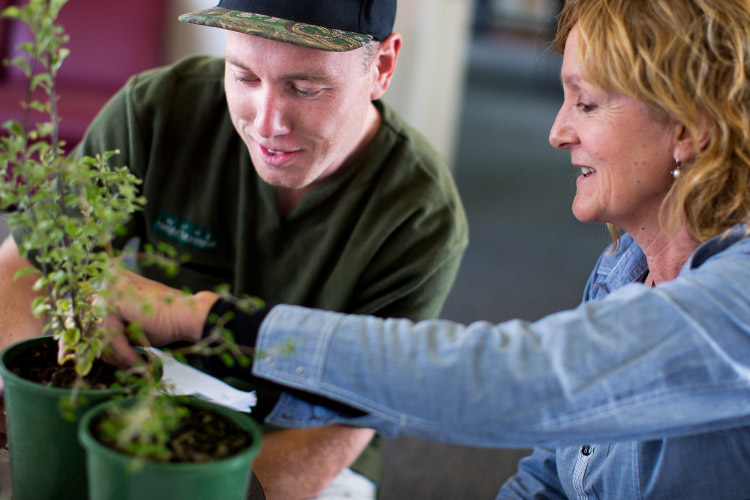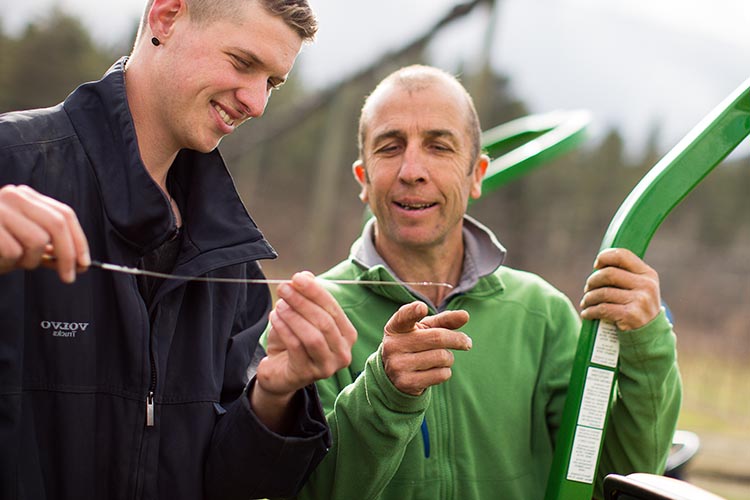Commonly confused words
Express your ideas clearly and accurately with these grammar guides.
When writing, you need to choose the correct word according to its spelling and meaning in the context. Not only does selecting the correct word improve your vocabulary and your writing, but it also makes a good impression on your readers. It also helps reduce confusion and improve clarity. There are many words in English that sound or look similar, and this can lead to confusion when using them in your writing.
Incorrect:
The result of the test effected the student’s overall mark.
This is incorrect because effect is a noun and it has been used here as a verb. Affect is the verb.
Correct:
The result of the test affected the student’s overall mark.
Misused words
Here is a list of some of the most commonly confused words:
| “Who” is subjective and is used when the pronoun acts as the object of a clause. | Who loves you? (She loves me.) |
| Usage depends on whether you are referring to the subject or object of a sentence. | I consulted with a doctor whom I met in school. (I consulted with him.) |
| To test, substitute “he” or “she” for “who,” and substitute “him” or “her” for whom. |
| “That” is a restrictive pronoun, which means the phrase following it is needed to understand the preceding statement. | I don’t like buying clothes that aren’t made in the USA. |
| “Which” introduces a relative clause and is used when there are qualifiers that may not be essential. | You should only buy clothes made locally, which are usually sold at smaller local businesses. |
| “Lay” requires a direct object (past tense: “laid”). | I lay my head upon the pillow. |
| “Lie” doesn’t need an object (past tense: “lay”). | Last night, I laid my head upon the pillow. |
| Common mistake: People use the past tense of “lay” when they mean to use the past tense of “lie.” | The stones lie near the river. |
| The stones lay near the river, waiting to be washed. |
| “Nor” means “and not.” | I bet neither Mike nor Jessie will like the movie. |
| Rule of thumb: Use “nor” with “neither” and “or” with “either”. | I bet either Mike or Jessie will not like the movie. |
| “Affect” is a verb that means “to influence or produce an impression.” | That movie affected me like no other movie has. |
| “Effect” is a noun that means “the result of.” | I felt no effect from the movie, I wish it affected me, but I thought it was boring. |
| “Since” refers to time. | Since I saw you last, I’ve gotten a new job. |
| “Because” refers to causation. | Because I saw you, I looked into that new job you recommended. |
| “Few” and “fewer” are for things you can count. | I ate fewer calories today than I did yesterday. |
| “Less” is for hypothetical quantities. | I need to eat less food so I can lose weight. |
| “Whether” expresses a condition where there are two or more alternatives. | I don’t know whether I will meet up with you later. |
| “If” expresses a condition where there are no alternatives. | I will meet up with you tonight if I finish my homework. |
| Both suggest there is a possibility of something happening, but use “may” when there’s a greater likelihood and “might” when there’s little to no chance. | I may see you later if I can finish my essay. |
| I might go to Europe this summer—if I can get over my fear of flying. |
| Whenever you write about people, use “who” to refer to them. | Jane is the girl who lives above me. |
| “Than” is used when comparing things. | She is much taller than me. |
| “Then” is used when referring to time. | I will see you first and then go to the store. |
| “It’s” is a contraction of “it is.” | It’s going to rain tomorrow. |
| “Its” is a possessive pronoun or adjective. | The dog licked its paw. |
| “Their” is used when referring to ownership or possession. | Their dog was barking so loudly, I couldn’t sleep. |
| “They’re” is a contraction of “they are.” | They’re going to go the movies later. |
| “There” is used when referring to location. | There is that sock I was looking for. |
| “Complement” refers to something that adds to or completes something else. | The fresh herbs really complement the chicken. |
| “Compliment” is something nice said about you. | She complimented me and said she liked my shoes. |
| “Loose” refers to when something is coming undone. | My trousers are so loose, I need a belt to keep them up. |
| “Lose” is the opposite of “win” or “gain.” | If I lose more weight, I’ll need a belt to keep my trousers up. |

Commonly confused words
Here is another list of some of the most commonly confused words:
- A (article). Used before a word that begins with a consonant.
a key, a mouse, a screen - An (article). Used before a word that begins with a vowel.
an airplane, an ocean, an igloo - And (conjunction). Connects two or more words together.
peanut butter and jelly, pen and pencil, jump and shout
- Are (verb). A conjugated form of the verb to be.
My cousins are all tall and blonde. - Our (pronoun). Indicates possession, usually follows the pronoun we.
We will bring our cameras to take pictures.
- By (preposition). Means next to.
My glasses are by the bed. - Buy (verb). Means to purchase.
I will buy new glasses after the doctor’s appointment.
- Know (verb). Means to understand or possess knowledge.
I know the male peacock sports the brilliant feathers. - No. Used to make a negative.
I have no time to visit the zoo this weekend.
- Of (preposition). Means from or about.
I studied maps of the city to know where to rent a new apartment. - Have (verb). Means to possess something.
I have many friends to help me move. - Have (linking verb). Used to connect verbs.
I should have helped her with that heavy box.
- Quite (adverb). Means really or truly.
My work will require quite a lot of concentration. - Quiet (adjective). Means not loud.
I need a quiet room to complete the assignments. - Quit (verb). Means to stop or to end.
I will quit when I am hungry for dinner.
- Right (adjective). Means proper or correct.
When bowling, she practices the right form. - Right (adjective). Also means the opposite of left.
The ball curved to the right and hit the last pin. - Write (verb). Means to communicate on paper.
After the team members bowl, I will write down their scores.
- Set (verb). Means to put an item down.
She set the mug on the saucer. - Set (noun). Means a group of similar objects.
All the mugs and saucers belonged in a set. - Sit (verb). Means to lower oneself down on a chair or another place.
I’ll sit on the sofa while she brews the tea.
- Suppose (verb). Means to think or to consider.
I suppose I will bake the bread, because no one else has the recipe. - Suppose (verb). Means to suggest.
Suppose we all split the cost of the dinner. - Supposed (verb). The past tense form of the verb suppose, meaning required or allowed.
She was supposed to create the menu.
- To (preposition). Indicates movement.
Let’s go to the circus. - To. A word that completes an infinitive verb.
to play, to ride, to watch. - Two. The number after one. It describes how many.
Two clowns squirted the elephants with water. - Too (adverb). Means also or very.
The tents were too loud, and we left.
- Use (verb). Means to apply for some purpose.
We use a weed whacker to trim the hedges. - Used. The past tense form of the verb to use
He used the lawnmower last night before it rained. - Used to. Indicates something done in the past but not in the present
He used to hire a team to landscape, but now he landscapes alone.
- Who’s (contraction). Joins the words who and either is or has.
Who’s the new student? Who’s met him? - Whose (pronoun). A form of who that shows possession.
Whose schedule allows them to take the new student on a campus tour?
- Your (pronoun). A form of you that shows possession.
Your book bag is unzipped. - You’re (contraction). Joins the words you and are.
You’re the girl with the unzipped book bag.

Strategies to avoid commonly confused words
The following strategies can help you avoid misusing confusing words.
Use a dictionary
Keep a dictionary at your desk while you write. Look up words when you are uncertain of their meanings or spellings. Many dictionaries are also available online, and the Internet’s easy access will not slow you down. Check out your cell phone or smartphone to see if a dictionary app is available.
Keep a list of words you commonly confuse
Be aware of the words that often confuse you. When you notice a pattern of confusing words, keep a list nearby, and consult the list as you write. Check the list again before you submit an assignment to your instructor.
Study the list of commonly confused words
You may not yet know which words confuse you, but before you sit down to write, study the words on the list. Prepare your mind for working with words by reviewing the commonly confused words identified in this section.
References
Attributions
This work includes material from the following sources:
The Saylor Foundation. (2013). Writing for success. Retrieved from http://www.saylor.org/site/textbooks/Writing%20for%20Success.pdf Licensed under a Creative Commons Attribution-NonCommercial-ShareAlike 3.0 Unported License.
wikiHow. (n.d.) Common grammar mistakes – cheat sheet. Retrieved from http://www.wikihow.com/Sample/Common-Grammar-Mistakes Licensed under a Creative Commons Attribution 3.0 License.


